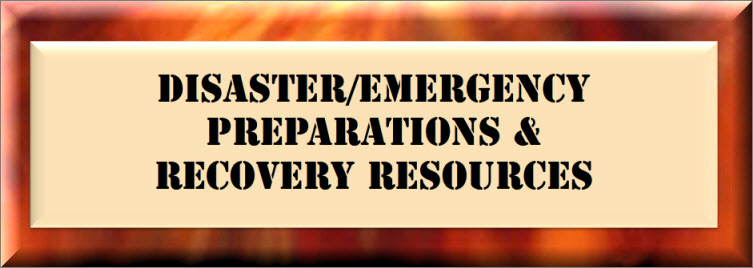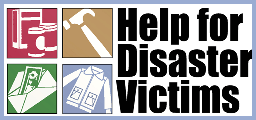|


-
Disaster and Emergency Resources (ASPR:
Administration for Strategic Preparedness and Response): Prepare, Respond, Recover
-
Ready.gov
- Plan Ahead for Disasters. Prepare for and respond to
emergencies including natural and man-made disasters.
-
Campus
Ready (Dept. of Homeland Security): Colleges and universities
are encouraged to review, update and exercise their emergency plans
several times per year.
-
Red Cross Disaster Apps: Stay safe during emergencies with expert tips
& useful tools. Check the Emergency App, Hurricane App, Tornado App, and
Earthquake App.
Emergency Preparedness: Are You Ready for a Disaster? (National
Safety Council): Safety tips specific to each of the following
emergencies: Earthquake, Flood, Hurricane, Tornado
Hurricane Safety Checklist (Red Cross)
Hurricane Preparedness
(National Safety Council)
FDA Hurricane
Safety Resources: FDA urges consumers to ensure
safety of food, water, medical supplies.
Natural Disaster & Severe Weather (CDC): current information on dealing with weather
emergencies, including floods, tornadoes, and wildfires.
Basic Disaster Supplies Kit: After an emergency, you may need to
survive on your own for several days. Being prepared means having your
own food, water and other supplies to last for several days. A disaster
supplies kit is a collection of basic items your household may need in
the event of an emergency.
Disaster Information Management Research Center (DIRMC) – U.S.
National Library of Medicine. The core purpose of is "to develop and
provide access to health information resources and technology for
disaster preparedness, response, and recovery."
CDC: Environmental Health Response and Recovery.
Disaster Preparation and Recovery (Medline Plus):
Preparing for a
disaster can reduce the fear, anxiety and losses that disasters cause.
Hurricanes
| Floods |
Tornadoes
|
Fires.
Emergency Preparedness and Response (CDC): Emergency
Preparedness and You Information, on Specific Types of Emergencies,
and more.
Disaster Preparedness Essentials (Angie’s List Infographic).
Make sure you're ready for 72 hours on your own, thanks to this
disaster preparedness toolkit.
Make a Disaster Plan for Your Pets
(Humane Society): How to keep
pets safe in natural disasters and everyday emergencies.
Home Safety for Older Adults: A Comprehensive Guide for 2023.
Includes: Emergency Help, Exterior Home Safety, Interior Home Safety,
Home Safety Checklist.
Emergency Supply List - FEMA (Ready.gov)
Winter Storm Preparedness (Red Cross): Each year, hundreds of
Americans are injured or killed by exposure to cold, vehicle accidents
on wintry roads, and fires caused by the improper use of heaters.
Prepare now so you can stay safe during blizzards and other winter
storms!
-
Ultimate Guide to Disaster Preparedness on a Budget: The Federal
Emergency Management Agency (FEMA) has found that 61 percent of surveyed
Americans have not created or practiced an emergency plan, while 80
percent of Americans live in counties that have experienced natural
disasters. Not having an emergency plan might mean losing a loved one or
pet. For small businesses, it might mean financial collapse.
USGS Natural Hazards Gateway: educates citizens, emergency
managers, and lawmakers on seven natural hazards facing the Nation–
Earthquakes, Floods, Hurricanes, Landslides, Tsunamis, Volcanoes,
and Wildfires
-
Extreme Heat Information. Provided by the Centers for Disease
Control and Prevention (CDC).
-
Heat Wave Safety (American Red Cross): Learn how to stay safe during
a heat wave and how to treat heat-related illness like heat exhaustion.
Financial Preparedness and Recovery From a Natural Disaster: After a
natural disaster, there are resources to help you get back on your feet
and recover financially. Learn what to do after a natural disaster to get
your life back to normal as soon as possible.
-
How to Prepare Your Finances for a Natural
Disaster (May 18, 2020): Having your finances, insurance and
important papers in order before a natural disaster strikes can ease the
stress of dealing with the damage and disruption caused by a hurricane,
earthquake or other catastrophic event.
-
Important Legal Documents for Emergency Preparedness: One of the
things that many people forget about is the important documents they
need in the event of an evacuation. If your family suddenly has to
vacate your home, and you only have time to grab your disaster kit
and run, you will want to make sure it has the right documents to
keep you on track. This list will help you prepare for the next
disaster with the right documents.
-
Radiation Emergencies: Although there are no guarantees of safety
during a radiation emergency, you can take actions to protect yourself.
You should have a disaster plan. Being prepared can help reduce fear,
anxiety and losses (Centers for Disease Control and Prevention).
-
Recovering from Disaster (FEMA): Health and Safety Guidelines
"on steps to take after disaster strikes in order to begin getting
your home, your community, and your life back to normal."
-
Returning Home After a Hurricane or Flood (Red Cross):
"Suggestions for returning to, inspecting and cleaning your home."
-
Disaster Recovery Guide
(American Red Cross)
-
Picking up the Pieces after a Disaster (FTC): developing a
recovery plan can give you a sense of hope and purpose. Here are a
few tips and links to resources to help make the task less
burdensome.
-
Recovering From a Natural Disaster in College – A Student’s Guide
for What to do on Campus: Figuring out what to do in the
immediate aftermath of a disaster - earthquake, hurricane or
flooding - is a challenge for anyone, but students living away from
home from the first time may feel particularly vulnerable.
-
Recovering from Disaster – Getting the Most from Your Homeowner's
Insurance. Natural disasters bring a wide path of devastation in
their wake. Long after the initial loss of life and injuries occur,
homeowners who are affected are left handling the cleanup.
-
Small Business Continuity & Disaster Recovery Guide: A business
continuity strategy is an emergency plan designed to help you safeguard
normal operations following a disaster such as a malware attack or a
natural disaster.
-
Watch Out for Charity Scams During Natural Disasters: When natural
disasters strike, it’s natural to feel concern for those caught in the
midst of the disaster.…What you may not realize is that there are others
in the world who see natural disasters as an opportunity take advantage
of our heartfelt concerns by setting up charity scams.
-
How Do Natural Disasters Affect Mental Health? "Though the
physical effects of natural disasters may fade within weeks or
months, the psychological toll these events take on individuals and
communities can linger for years. There are strategies that
individuals and disaster-prone communities can use to build
resilience ahead of traumatic events and combat the mental health
impacts of natural disasters when they strike."
|